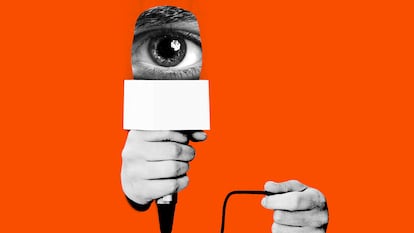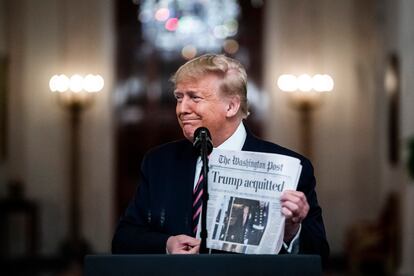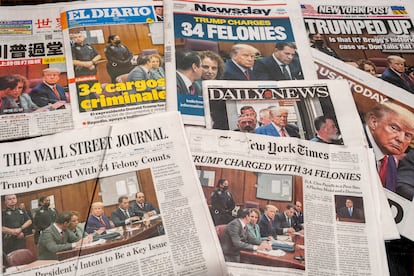Has objectivity in media died (if it ever existed)?
Issues such as racism, women’s rights or climate change demand anything but neutrality, say those who call on journalists to embrace a position that is explicitly ‘pro-democracy.’ Others, however, fear that a step away from this ideal will further erode trust in the news

Journalists, editors, media critics and academics have been announcing for some time now the death of objectivity in U.S. newspapers, magazines and universities. But not all of them. Others think that the report of that death is, like Mark Twain’s, an “exaggeration.” While this debate isn’t new, it’s gained new strength in an increasingly polarized society.
In the trenches of the so-called “objectivity wars” are those who argue that the time has come to retire a century-old concept that journalism theorist Walter Lippmann advocated for in his 1920 book, Liberty and the News. He noted that — back then, just like today — people didn’t react to truths, “but to opinions.”
Lippmann asked reporters not to serve any cause “no matter how worthy.” Instead, he proposed applying scientific methods to professionalize the media, which, until that point, had been openly partisan. His proposal was so successful that the ideal of objectivity became the center of American newsrooms.
Among the defenders of maintaining the state quo are Marty Baron — former executive editor of The Washington Post — and A. G. Sulzberger, the chairman of The New York Times. A couple of weeks ago, in the Columbia Journalism Review (CJR) — a space that has devoted a lot of attention to this debate — Sulzberger wrote that “there will be no worthwhile future for journalism if our profession abandons the core value that makes our work essential to democratic society […] that value is journalistic independence. [...] Independent journalism elevates values grounded in humility — fairness, impartiality, and (to use perhaps the most fraught and argued-over word in journalism) objectivity — as ideals to be pursued, even if they can never be perfectly achieved.”
Critics of this vision — championed by the heir to one of the most powerful media families in the world — maintain that objectivity is an ideal set too many years ago by a handful of wealthy white men like Sulzberger. They note that, in a society (and in most newsrooms) that is increasingly diverse, such an ideal only serves to preserve the position of those at the top. These critics also believe that we are living in extraordinary times that call for extraordinary measures. Disinformation is rampant and, in order to survive, cable television has blurred the lines between facts and opinions. The tyranny of clicks results in everything getting mixed up, while some politicians attack the media, accusing it of peddling “socialist propaganda” and engaging in the business of so-called “fake news.”
Faced with such a panorama, many in the field of journalism opine that pretending that objectivity is sought in urgent matters — such as racism, climate change and the rights of women and LGBTQ groups — doesn’t make sense. Rather, they advocate that the defense of democracy comes before attempting to not take sides. Pretending that a media outlet or a journalist doesn’t have a point of view on major societal issues is not only absurd, these voices add, but also dangerous, since it bolsters the notion of false balance or “bothesideism,” a concept popularized, Sulzberger wrote, by associate professor of journalism at New York University Jay Rosen.
“The problem comes when you live in a country in which one of the parties, the Republican Party, have an attitude towards propaganda that floods the public square with false statements lies and bullshit,” Rosen recently explained to EL PAÍS via Zoom. According to this reasoning, these politicians take advantage of the fact that the traditional media outlets are forced to give voice to “the other side,” which subsequently uses the opportunity to spread extremist discourse. This also creates a breeding ground for lazy journalistic practices, attributable to what Sulzberger acknowledges as “the mechanics of deadline journalism.”
“Journalists should not quote a fringe position to check a box or shield their work from accusations of bias,” the publisher writes in the CJR.

This past January, a report from Arizona State University (ASU) came out, lending credibility to Rosen and others who scoff at maintaining the old ideal of objectivity. The authors — who both teach at ASU’s School of Journalism — are former CBS News president Andrew Heyward and former executive editor of The Washington Post Leonard Downie Jr. The two men interviewed 75 influential people in the news industry, who were in broad agreement that “truth-seeking news media must move beyond whatever ‘objectivity’ once meant to produce more trustworthy news.”
In his op-ed for The Washington Post, Downie Jr. shared the study’s findings, which cited views such as those from San Francisco Chronicle editor Emilio García-Ruiz — “objectivity has got to go” — and Kathleen Carrol, former executive editor at the Associated Press: “Objective by whose standard?” She wonders whether the standard is “white, educated and fairly wealthy… when people don’t feel like they find themselves in news coverage, it’s because they don’t fit that definition.”
Cheered on by this chorus of voices, Downie Jr. concludes that he has the impression of being at “the beginning of another generational shift” in American journalism, whose influence around the world continues to be quite powerful.
The Trump effect
Marty Baron is another strong voice that advocates for objectivity. Also a former editor of Post, he led a team of reporters at The Boston Globe that exposed sexual abuse by the Catholic Church, immortalized in the Oscar-winning film Spotlight. In an op-ed, he recently responded to the article of Downie Jr. It was titled We Want Objective Judges and Doctors. Why Not Journalists, Too?
“Objectivity is not always achieved,” he acknowledged, but “failure to achieve standards does not obviate the need for them. It does not render them outmoded. It makes them more necessary. And it requires that we apply them more consistently and enforce them more firmly.”
Admitting that his position is “terribly unpopular” in his profession at the moment, Baron has a response for those who say that the media needs to be “explicitly pro-democracy.”
“I would say this: every newspaper I’ve ever worked for always has been [democratic]. They have been vigorously protecting democracy for decades. How is it possible that you failed to notice?”
Also on his side is David Greenberg, a professor of Media Studies at Rutgers University, New Brunswick. In a Spring 2021 issue of the journal Liberties, he made an extensive defense of objectivity, which he defines as “the relentless attempt to correct subjectivity and, therefore, approach what people of diverse viewpoints can agree to be the truth.”
In an interview with EL PAÍS, Greenberg explained that there has always been a place for a kind of journalism that, “for example, speak to the Black, Jewish or the gay communities experiences. In other words, a journalism that is transparent about having a viewpoint and an agenda and a perspective, and nobody’s saying that needs to go away. What we’re debating is whether to preserve institutions like The New York Times, or the Associated Press, or CBS nightly news as places where anyone can go to get roughly the same reliable, accurate account of news events, before moving into a political debate about the implications of those events. And it seems to me, if you were to survey people in newsrooms, they would largely agree that that is worth preserving.”
Perhaps the only thing that both sides agree is that Donald Trump is what makes this more than a theoretical debate. In a phone interview, Graciela Mochkofsky — dean of the Craig Newmark Graduate School of Journalism at the City University of New York (CUNY) — recalls how Trump’s four years in the White House blew up the instruction manual for traditional media, which was slow to react to the fact that he lied so blatantly. The discussion about objectivity becomes more relevant, according to the journalist, given that a new fight between Trump and Biden is most likely coming up. Will the mainstream media tell both versions when reporting on the former president and his supporters, who still overwhelmingly believe the hoax that the Democrats stole the 2020 election? Will major media companies reveal anything that could damage Biden’s aspirations, knowing that it will anger their readers and viewers and benefit Trump, a president who has proven to be dangerous for democracy?
Mochkofsky clarifies that such questions don’t even arise in strongly partisan environments, such as Fox News. This was demonstrated once again with the lawsuit filed by Dominion Voting Systems against Rupert Murdoch’s media company, based on the spread of harmful hoaxes about the 2020 elections which tarnished Dominion’s name. To avoid trial, Fox New paid a $787.5 million settlement. What emerged from the case summary made it clear that the Fox journalists didn’t even believe the lies they were telling about the alleged 2020 electoral fraud. In order to keep ratings up, they couldn’t contradict their audience.
The decision of CNN to recently broadcast a controversial town hall and interview with Trump has also been criticized, although the company’s owners say it is part of a journey that wants to bring CNN from the left to the center, so as to broaden the channel’s viewing audience. The occasion allowed the former president to tell many lies for more than an hour, with hardly any formidable opposition. This raises the question of whether the media has learned anything from the unchecked coverage they gave Trump during the 2016 presidential campaign, which ultimately led him to the White House.
The impartiality we need
Trans journalist Lewis Raven Wallace doesn’t believe so. In 2017, Wallace was dismissed from the public radio show Marketplace after publishing a blog post about Trump shortly after his inauguration. Entitled Objectivity Is Dead and I’m Okay With It, Wallace questioned legacy media’s insistence on neutrality at a time when the presidential administration believed in “alternative facts” and the president was espousing “white racial superiority.” The program that Wallace worked for considered this to be a departure from the position of impartiality that it demands of its journalists.
“I know what I’m talking about,” Wallace tells EL PAÍS in an interview. “I belong to a marginalized community, that has suffered for decades in the name of objectivity. The ‘both sides’ approach essentially gives a massive platform to a tiny fringe group of extremely transphobic and deliberately misinformed speakers to spread their dangerous points of view among people that, not long ago, were just ignorant.” An example of this, he adds, is The New York Times, which has recently been criticized for its coverage of the reality of trans people, in an open letter signed by a thousand of its former and past contributors.

Wallace went further in his book, The View from Somewhere, where he reviews the history of the idea of objectivity, dwelling on extreme examples, such as a 1990 Los Angeles Times headline that asked, “Can women reporters write objectively on the abortion issues?”
“There are outlets,” Wallace emphasizes, “that still think a gay reporter can’t write about LGBTI or that a Black person is not the best choice to cover racial issues.”
“The problem,” says Rosen, “is that [those outlets] hire, let’s say, African American or Hispanic, gay or trans people with the logic being that their perspective is needed in the newsroom. And then once they get there, they learn that their perspective is supposed to be checked at the door. That contradiction has been sitting there for a long time. You don’t want to lose those people. But you also don’t want to lose this system of objectivity, which has been very good to the bosses over the years, because it’s a system of social control. That is how you keep controlling people.”
Another article that marked a milestone in the discussion revolved around the idea of diversity. It was written in 2020 by Wesley Lowery and published in The New York Times. The op-ed — titled A Reckoning Over Objectivity, Led by Black Journalists — denounced that “the views and inclinations of whiteness are accepted as the objective neutral.” This idea, Lowery argues, “is constructed atop a pyramid of subjective decision-making: which stories to cover, how intensely to cover those stories, which sources to seek out and include, which pieces of information are highlighted and which are downplayed. No journalistic process is objective. And no individual journalist is objective, because no human being is.”
Emmanuel Felton, a Black reporter on race and ethnicity for The Washington Post, believes that this is what makes this “a decidedly human job.” “If you send an African American and a white guy to tell the same story in a Black neighborhood, they will come back with two very different versions. The challenge is to admit that this is not necessarily a negative thing.”
Jeff Jarvis — a professor of Journalism Innovation at CUNY — believes that what’s behind the not allowing someone who is “too implicated” to write about a specific subject is the equivalent of saying: “We don’t value your experience. We think that’s biased. We think you can’t be objective. That’s offensive.” At the start of each course, he recommends that his students read Wallace’s book, as well as Lowery’s Times article. He feels that for the big outlets “objectivity becomes a cloak to hide behind, away from controversy, away from tough decisions.” “To not recognize the Tucker Carlson is a white supremacist is to lie to the public, to not recognize the fascism of the far right America is to lie to the public we serve.”
Many of these institutions, Jarvis says, have rules about what their reporters can and cannot tweet — which, in his opinion, should boil down to just two: “Don’t be an idiot” and “it’s not smart to jump on Twitter after having had a nice few glasses of wine.” Oftentimes, media companies also prohibit employees from attending public demonstrations. “In some newsrooms, advocacy is still a dirty word. But I don’t have a problem with it. We’ve always been advocates. We should have advocated for equity and we advocate for the little guy against the man in power. But we weren’t sufficiently transparent and honest about that. And we hid behind this myth of objectivity, and inevitably failed at it. That’s a lot of the reason I think that that in America at least trust in journalism and media has been failing since the seventies.”
According to Gallup, public trust in the media in the U.S. is at record lows: only 16% of those consulted show a high degree of trust in newspapers… a number that falls to only 11% in the case of television. In his CJR article, Sulzberger attributes these figures to exactly the opposite reason being argued by people like Jarvis: to the fact that, in the new internet order, journalism seems “partisan and unreliable.” Sulzberger goes on to lament that “barely over one-quarter of Americans trust the news, according to a Reuters Institute report, a figure that now ranks lowest of the countries they surveyed.”
Rasmus Kleis Nielsen — director of the Reuters Institute — spoke to EL PAÍS by videoconference from his office in Oxford. Nielsen says that, in Europe, the big media debate doesn’t revolve around the the idea of objectivity as much as other ideas such as “commitment to truth or impartiality.” These concepts apply mainly to public service media, “who are often required by law to remain impartial.” “It’s not the case in every country, but in many parts of Europe it is. You can criticize them for not being impartial or for being in cahoots with the government. Sometimes these criticisms are fair, but the the aspiration is nonetheless impartiality. The other type is typically news agencies, whether they are private companies like Reuters or public,” he explains.
The most notable case would be that of the BBC, whose controversies have recently revolved around its coverage of Brexit, or whether or not contributors as sports commentator Gary Lineker are authorized to express their personal opinions without undermining the national broadcaster’s claim of impartiality.
“The biggest difference I think in Europe versus America,” Nielsen adds, “is that in Europe the vast majority of upmarket newspapers have a very clear and explicit editorial line and they will aim to deliver accurate news reporting, but they will rarely claim to be impartial.”
According to Nielsen, the data presented by the Reuters Institute indicates that “the majority [of information consumers] express their desire for the media to remain impartial” and that “there is a minority — a sizeable one, but a minority — who think, nonetheless, that news organizations should take a stance.”
In a 2021 comparative study, 69% of Americans believed that the media should accommodate a range of views, compared to 74% on average for the four countries surveyed (United States, United Kingdom, Brazil and Germany). When respondents were asked if they also demanded neutrality on all issues equally, the percentages fell to 57% and 66% respectively. Nielsen warns that the minority who thinks that media should take stance in some issues is bigger the younger it gets.

This generational bias is key to the debate on objectivity in the United States. If simple demographic evolution ends up changing the playing field, what will happen? What alternative model to the ideal of objectivity will be proposed? In response to these questions, the most common answer is “transparency.”
“Transparency both about your beliefs and your funding sources, but also transparency about the process of journalism itself,” Wallace states. “It’s like saying: here’s where I come from,” clarifies Rosen, who adds that his work must be accompanied by “high standards of certification.”
“Verification, not objectivity is to me the heart of journalism. Did this really happen? Did it happen that way? What we know what we don’t know? To me that is by far the most important thing that journalists can do to be trusted. Also a healthy self criticism so that when you make a mistake, you admit it.”
Rosen cites Semafor as a good example of this: it’s a news website which presents an article by a reporter, which is followed up by said reporter’s opinion on the subject that they have just covered. The most-cited reference, however, is perhaps The Marshall Project, a non-profit website that deals with issues related to criminal justice and starts from the (non-objective) premise that the U.S. prison system “is broken,” while also stating its mission to do everything possible to fix it, by the using the highest standards of classic journalism.
The Marshall Project was founded in 2014 by Bill Keller, former executive editor of The New York Times. When asked about the objectivity debate by EL PAÍS, the veteran journalist responded via email:
“I tend to avoid the word ‘objectivity’ because it implies pure truth, which may be an aspiration but is rarely within reach of mere humans. As Brooke Gladstone of NPR has written, there are all kinds of bias that creep into journalism — access bias (a tendency to give more weight to sources who cooperate), commercial bias (stories that are new and sexy sell) and bad news bias (bad news is more dramatic). I do believe journalism should be based on evidence rather than prejudice, and that’s true whether we’re talking about straight news or opinion journalism. There’s a great line attributed to [the politician and diplomat] Daniel Patrick Moynihan: you are entitled to your own opinions but you are not entitled to your own facts.”
Sign up for our weekly newsletter to get more English-language news coverage from EL PAÍS USA Edition
Tu suscripción se está usando en otro dispositivo
¿Quieres añadir otro usuario a tu suscripción?
Si continúas leyendo en este dispositivo, no se podrá leer en el otro.
FlechaTu suscripción se está usando en otro dispositivo y solo puedes acceder a EL PAÍS desde un dispositivo a la vez.
Si quieres compartir tu cuenta, cambia tu suscripción a la modalidad Premium, así podrás añadir otro usuario. Cada uno accederá con su propia cuenta de email, lo que os permitirá personalizar vuestra experiencia en EL PAÍS.
¿Tienes una suscripción de empresa? Accede aquí para contratar más cuentas.
En el caso de no saber quién está usando tu cuenta, te recomendamos cambiar tu contraseña aquí.
Si decides continuar compartiendo tu cuenta, este mensaje se mostrará en tu dispositivo y en el de la otra persona que está usando tu cuenta de forma indefinida, afectando a tu experiencia de lectura. Puedes consultar aquí los términos y condiciones de la suscripción digital.









































